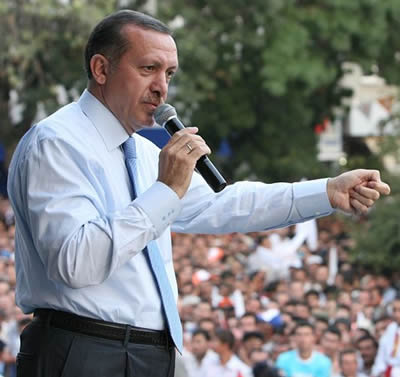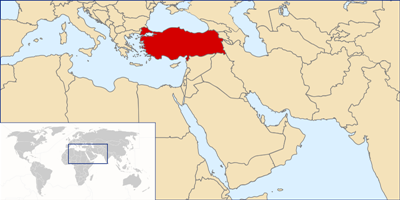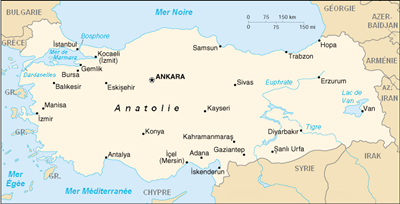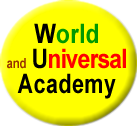|
||||||||||||||||||||||||||||||||||||||||||
The World and Universal Academy Foundation has for ideal goals to promote the arts, the culture and the peace world-wide.
|
||||||||||||||||||||||||||||||||||||||||||
Elect the best (the worst) European Government leader |
ÉLISEZ LES MEILLEURS POLITICIENS (2007/08) |
 |
Recep Tayyip Erdoğan |
Prime Minister of Turkey |
Président du Conseil (premier ministre) de la Turquie |
 |
Recep Tayyip Erdoğan (born February 26, 1954), became the Prime Minister of Turkey on March 14, 2003. He is the leader of the Adalet ve Kalkınma Partisi (AKP, or Justice and Development Party). Early life and careerErdoğan was born in Istanbul, Turkey, but spent his early childhood in Rize on the Black Sea Coast before returning to Istanbul at the age of 13. He was educated at a religious Imam Hatip school and at Marmara University's school of economics and business. Erdoğan played semi-professional football for 16 years and worked for Istanbul's municipal transport company, IETT and became active in politics with the now-defunct National Salvation Party (Milli Selâmet Partisi), led by Necmettin Erbakan. Political careerAfter the 1980 coup, all political parties were disbanded, but the National Salvation Party's former members founded the Welfare Party (Refah Partisi) after the restoration of democracy in 1983. In 1985 Erdoğan became the Welfare Party's chairman in Istanbul Province and stood for election as Mayor of the cosmopolitan Beyoğlu borough in central Istanbul and as a candidate for the Turkish Grand National Assembly several times in the late 1980s. During this period Turkish Islamist politics entered a period of chaos. In 1997, the Welfare Party was declared unconstitutional and was shut down on the grounds of threatening the secular nature of the state. The disbanded party promptly reformed itself under a new name, the Virtue Party (Fazilet Partisi), which in turn was found unconstitutional on the same grounds in 1999. Erdoğan led his group into the new Justice and Development Party (Adalet ve Kalkınma Partisi), while the traditionalists formed the Felicity Party (Saadet Partisi). The Justice and Development Party, on the back of widespread discontent with the traditional parties' handling of the economy and the 1999 earthquake, took 34.3% of the vote in the 3 November 2002 parliamentary elections, and due to Turkey's system of allotting seats, won an overall majority in the Grand National Assembly. Erdoğan's appointment as Prime Minister was delayed after his party's victory in the elections for legal reasons. He had been barred from standing in those elections because of a previous criminal conviction for reading an Islamist poem at a political rally, an action deemed to amount to Islamist sedition in today's modern secular Turkey, and for which he served several months in jail. The prime minister in Turkey must be a member of parliament and the constitution excluded those with previous convictions from standing. A prominent supporter of Erdoğan, Abdullah Gül, became a stand-in prime minister and pushed through a constitutional amendment that allowed Erdoğan to win a freshly vacant seat in the province of Siirt in a by-election. Gül resigned (to later become minister of foreign affairs) and Erdoğan was appointed Prime Minister by President Ahmet Necdet Sezer. DetailsOn 17 October 2006, the Premier Erdoğan suffered while in public a mild shock due to hypoglycemia, certainly influenced by the corporal fatigue caused by the Ramadan's day of fasting. He was hospitalized but the doctors view his state of health as being of no serious concern further than requiring a few days of rest. He gave a speech in New York on 19 December, 2006 where he talked mainly about the good relations between the citizens of Turkey who come from different backgrounds by giving an example from his own life. Erdoğan said that he doesn't have any problems with his wife, Emine Erdoğan, who comes from an Arabic origin. They are married since 4 July 1978, and they have two sons and two daughters. |
| Read more |
FRANÇAIS |
Recep Tayyip Erdoğan (né le 26 février 1954 à Istanbul) est le président du Conseil (premier ministre) de la Turquie depuis le 11 mars 2003. Sa jeunesseNé en 1954 dans un vieux quartier populaire d’Istanbul (Kasımpaşa), il est issu d'une famille de la communauté gürcü, originaire de la côte de la Mer Noire, à Rize. Son père était un ancien capitaine du port d'Istanbul. Très jeune il doit vendre des simit (petits pains en anneau) pour nourrir sa famille très pauvre. Sa famille l'envoie étudier dans une école religieuse qui forme des imams ( « imam-hatip »). Ce type de lycée est très prisé en Turquie par les familles traditionalistes, mais il ne destine pas nécessairement à la carrière d’imam. À 16 ans, Erdoğan remplace l'imam à la mosquée pour réciter des prières, pour les naissances ou pour organiser le rituel des décès. Sa carrière politiqueIl a étudié la politique et l'économie à Istanbul et a travaillé en tant qu'employé d'entreprises de transport et en tant qu'entrepreneur indépendant. Au milieu des années soixante-dix il adhère à l'organisation de jeunesse du Parti islamiste du Salut National MSP. Erdoğan Premier MinistreDès le début de son mandat, Erdoğan joue la carte de l'intégration européenne, coupant l'herbe sous le pied de ses opposants laïcistes. Son gouvernement obtient en décembre 2004 la promesse de l'UE d'entamer des négociations d'adhésion le 3 octobre 2005. Promesse tenue l'année suivante, malgré l'absence de reconnaissance de la République Chypriote et la négation du génocide arménien. Il vit aujourd'hui dans une villa d'un quartier modeste d'Ankara, et demeure passionné de football. Il se rend aux matchs à bord de sa Mercedes blindée. Les réformes du gouvernement ErdoğanSon mandat fut marqué par quelques réformes ambitieuses.
La mise en œuvre de ces réformes s'est toutefois heurtée aux résistances de l'appareil d'Etat. Politique intérieureAvec 34% des voix aux élections l'AKP domine largement le Parlement (363 députés sur 550), à cinq sièges seulement de la majorité des deux tiers qui lui permet d'amender la Constitution. Depuis 1987 c'est le premier parti à disposer d'une majorité stable et le seul depuis 1945 à n'avoir qu'une autre force politique en face de lui au Parlement. Ce qui permet au gouvernement Erdoğan de mener sa propre politique sans entrave de l'opposition. |
| Lire plus |
 |
 |
From Wikipedia.org |

